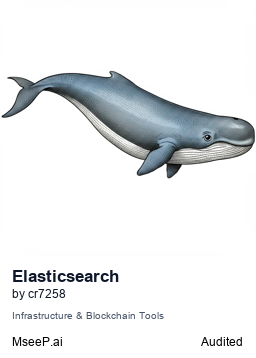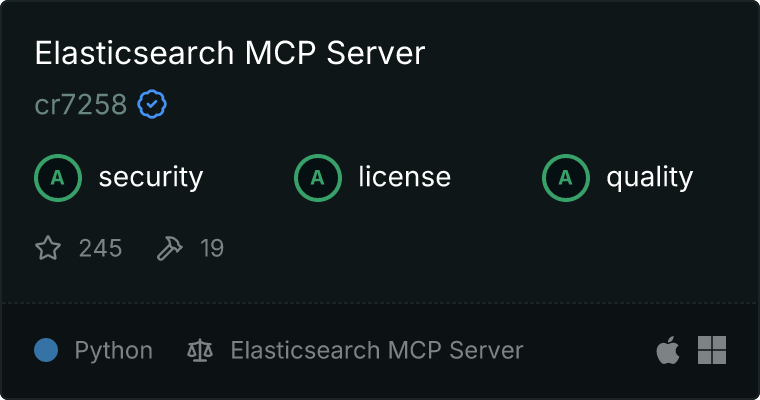# Elasticsearch/OpenSearch MCP Server
[](https://mseep.ai/app/cr7258-elasticsearch-mcp-server)
## Overview
A Model Context Protocol (MCP) server implementation that provides Elasticsearch and OpenSearch interaction. This server enables searching documents, analyzing indices, and managing cluster through a set of tools.

## Demo
https://github.com/user-attachments/assets/f7409e31-fac4-4321-9c94-b0ff2ea7ff15
## Features
### General Operations
- \`general_api_request\`: Perform a general HTTP API request. Use this tool for any Elasticsearch/OpenSearch API that does not have a dedicated tool.
### Index Operations
- \`list_indices\`: List all indices.
- \`get_index\`: Returns information (mappings, settings, aliases) about one or more indices.
- \`create_index\`: Create a new index.
- \`delete_index\`: Delete an index.
### Document Operations
- \`search_documents\`: Search for documents.
- \`index_document\`: Creates or updates a document in the index.
- \`get_document\`: Get a document by ID.
- \`delete_document\`: Delete a document by ID.
- \`delete_by_query\`: Deletes documents matching the provided query.
### Cluster Operations
- \`get_cluster_health\`: Returns basic information about the health of the cluster.
- \`get_cluster_stats\`: Returns high-level overview of cluster statistics.
### Alias Operations
- \`list_aliases\`: List all aliases.
- \`get_alias\`: Get alias information for a specific index.
- \`put_alias\`: Create or update an alias for a specific index.
- \`delete_alias\`: Delete an alias for a specific index.
## Configure Environment Variables
Copy the \`.env.example\` file to \`.env\` and update the values accordingly.
## Start Elasticsearch/OpenSearch Cluster
Start the Elasticsearch/OpenSearch cluster using Docker Compose:
\`\`\`bash
# For Elasticsearch
docker-compose -f docker-compose-elasticsearch.yml up -d
# For OpenSearch
docker-compose -f docker-compose-opensearch.yml up -d
\`\`\`
The default Elasticsearch username is \`elastic\` and password is \`test123\`. The default OpenSearch username is \`admin\` and password is \`admin\`.
You can access Kibana/OpenSearch Dashboards from http://localhost:5601.
## Stdio
### Option 1: Using uvx
Using \`uvx\` will automatically install the package from PyPI, no need to clone the repository locally. Add the following configuration to 's config file \`claude_desktop_config.json\`.
\`\`\`json
// For Elasticsearch
\{
"mcpServers": \{
"elasticsearch-mcp-server": \{
"command": "uvx",
"args": [
"elasticsearch-mcp-server"
],
"env": \{
"ELASTICSEARCH_HOSTS": "https://localhost:9200",
"ELASTICSEARCH_USERNAME": "elastic",
"ELASTICSEARCH_PASSWORD": "test123"
\}
\}
\}
\}
// For OpenSearch
\{
"mcpServers": \{
"opensearch-mcp-server": \{
"command": "uvx",
"args": [
"opensearch-mcp-server"
],
"env": \{
"OPENSEARCH_HOSTS": "https://localhost:9200",
"OPENSEARCH_USERNAME": "admin",
"OPENSEARCH_PASSWORD": "admin"
\}
\}
\}
\}
\`\`\`
### Option 2: Using uv with local development
Using \`uv\` requires cloning the repository locally and specifying the path to the source code. Add the following configuration to Claude Desktop's config file \`claude_desktop_config.json\`.
\`\`\`json
// For Elasticsearch
\{
"mcpServers": \{
"elasticsearch-mcp-server": \{
"command": "uv",
"args": [
"--directory",
"path/to/src/elasticsearch_mcp_server",
"run",
"elasticsearch-mcp-server"
],
"env": \{
"ELASTICSEARCH_HOSTS": "https://localhost:9200",
"ELASTICSEARCH_USERNAME": "elastic",
"ELASTICSEARCH_PASSWORD": "test123"
\}
\}
\}
\}
// For OpenSearch
\{
"mcpServers": \{
"opensearch-mcp-server": \{
"command": "uv",
"args": [
"--directory",
"path/to/src/elasticsearch_mcp_server",
"run",
"opensearch-mcp-server"
],
"env": \{
"OPENSEARCH_HOSTS": "https://localhost:9200",
"OPENSEARCH_USERNAME": "admin",
"OPENSEARCH_PASSWORD": "admin"
\}
\}
\}
\}
\`\`\`
## SSE
### Option 1: Using uvx
\`\`\`bash
# export environment variables
export ELASTICSEARCH_HOSTS="https://localhost:9200"
export ELASTICSEARCH_USERNAME="elastic"
export ELASTICSEARCH_PASSWORD="test123"
# By default, the SSE MCP server will serve on http://127.0.0.1:8000/sse
uvx elasticsearch-mcp-server --transport sse
# The host, port, and path can be specified using the --host, --port, and --path options
uvx elasticsearch-mcp-server --transport sse --host 0.0.0.0 --port 8000 --path /sse
\`\`\`
### Option 2: Using uv
\`\`\`bash
# By default, the SSE MCP server will serve on http://127.0.0.1:8000/sse
uv run src/server.py elasticsearch-mcp-server --transport sse
# The host, port, and path can be specified using the --host, --port, and --path options
uv run src/server.py elasticsearch-mcp-server --transport sse --host 0.0.0.0 --port 8000 --path /sse
\`\`\`
## Streamable HTTP
### Option 1: Using uvx
\`\`\`bash
# export environment variables
export ELASTICSEARCH_HOSTS="https://localhost:9200"
export ELASTICSEARCH_USERNAME="elastic"
export ELASTICSEARCH_PASSWORD="test123"
# By default, the Streamable HTTP MCP server will serve on http://127.0.0.1:8000/mcp
uvx elasticsearch-mcp-server --transport streamable-http
# The host, port, and path can be specified using the --host, --port, and --path options
uvx elasticsearch-mcp-server --transport streamable-http --host 0.0.0.0 --port 8000 --path /mcp
\`\`\`
### Option 2: Using uv
\`\`\`bash
# By default, the Streamable HTTP MCP server will serve on http://127.0.0.1:8000/mcp
uv run src/server.py elasticsearch-mcp-server --transport streamable-http
# The host, port, and path can be specified using the --host, --port, and --path options
uv run src/server.py elasticsearch-mcp-server --transport streamable-http --host 0.0.0.0 --port 8000 --path /mcp
\`\`\`
## Compatibility
The MCP server is compatible with Elasticsearch 7.x, 8.x, and 9.x. By default, it uses the Elasticsearch 8.x client (without a suffix). To use the Elasticsearch 7.x client, run the \`elasticsearch-mcp-server-es7\` variant. For Elasticsearch 9.x, use \`elasticsearch-mcp-server-es9\`. For example:
\`\`\`bash
uvx elasticsearch-mcp-server-es7
\`\`\`
| MCP Server | Elasticsearch |
| --- | --- |
| elasticsearch-mcp-server-es7 | Elasticsearch 7.x |
| elasticsearch-mcp-server | Elasticsearch 8.x |
| elasticsearch-mcp-server-es9 | Elasticsearch 9.x |
| opensearch-mcp-server | OpenSearch 1.x, 2.x, 3.x |
## License
This project is licensed under the Apache License Version 2.0 - see the [LICENSE](LICENSE) file for details.


Reply